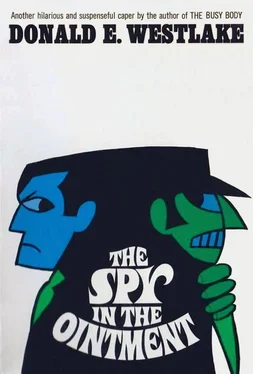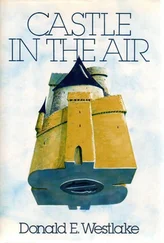When he turned to Angela, I said, “Hold it.”
“Frisk,” he said, like far-off thunder.
Although there was certainly no indication, either in his face or voice, that he anticipated taking any pleasure in the frisking of Angela, I knew I dared not permit him to do so. If I were to stand quietly by while Angela was being thump-thump-thumped, it would be all up with us forever, of that I was certain. And who would fix the mimeograph then? Who would pay the rent? (Not to mention Chinese-red bras.)
I said, “Wait. Hold it a second. Angela, take off your coat.”
She did so, and stood there holding it, wearing now her dark blue sweater and white stretch pants. I said to the monster. “She doesn’t have any weapons. Where’s she going to hide weapons?” To Angela, I said, “Give him the coat, let him check the pockets.”
“Okay,” she said. She was looking a little pale around the cheeks. She handed him the coat, and he went ponderously through the pockets, like an elephant looking for a peanut. He came across the ballpoint pen and the steno pad, but seemed unimpressed by them.
Finding no weapons, he looked at Angela again, thought about things for a few seconds, and then said, “Okay,” and handed her back her coat. He motioned at the maroon drapes and said, “Go in.”
We looked at one another, Angela and I. She reached out and took my hand, and held it tight. I inhaled, held my breath, stepped forward, pushed aside the maroon drapes, and went in.
Before us stretched a long room, old-looking but brightly lit by fluorescent ceiling fixtures that must have been a very recent addition. The room was filled with rows of wooden folding chairs, all facing a raised speaker’s platform at the far end. An old wooden desk stood on this platform, and a row of folding chairs lined the wall behind it. An American flag sagged on a pole to the right of the platform, and some sort of yellow and brown flag created symmetry on the other side. The walls were lined with framed and glassed and dusty photographs of groups of people in unlikely uniforms; they looked like so many pictures of the Bolivian Navy.
Although there were seats available for about a hundred people, scarcely a dozen men and women were in the room, all clustered near the platform up front. Hand in hand, Angela and I walked down the central aisle between the folding chairs, and the closer we got the less cheerful looked the people we were moving toward. A certain electric frenzy seemed to cackle bluely in the air around each and every one of them, as though we had inadvertently come upon the organizational meeting of the Mad Scientists’ Geophysical Year, which in a way is exactly what we had.
Mortimer Eustaly popped from this group as we approached it, coming toward us with his most Levantine smile, his well-manicured hand extended as he said, “Raxford, Raxford! So glad you could come. And this very charming lady?” If looks could impregnate, the one Eustaly turned on Angela now would have fought the pill to a draw.
“My secretary,” I said. “Miss Angela Ten—” Whoops! Cursing myself for an idiot, I managed a fairly convincing coughing spell, and said, “Sorry. The rain. Miss Angela Tenn.” To Angela, I added, “This is Mr. Eustaly.”
“Miss Tenn,” he purred, and held her hand in a way he should have been arrested for.
Angela’s smile seemed to me a little forced, and her voice unusually faint, as she said, “How do you do?” And tugged her hand out of his grasp.
Eustaly, with some reluctance, turned his attention back to me. “We’re just waiting for one or two others,” he said, “and then we’ll get right to business.”
“That’s all right,” I said.
A short, thin, vicious-looking Negro woman, in a black dress and a black hat with rhinestones and a long black feather angling upward, joined us at that moment, plucking Eustaly by the sleeve and saying, “Eustaly, you didn’t tell me they was going to be kikes here.” Her voice sounded like a subway with the brakes on, and she herself looked like the mean relation of a character by Dr. Seuss.
Eustaly smiled upon her like an encyclopedia salesman, said, “Oh, we’ll cover that, Mrs. Baba, in the course of the meeting. Now, here’s some people you can have a nice chat with, J. Eugene Raxford and Miss Angela Tenn of the Citizens’ Independence Union.” Turning to us, he said, “May I present Mrs. Elly Baba of the Pan-Arabian World Freedom Society? A charming lady.” To the charming lady he said, “I leave you in good hands,” and slid out of our grasp like mercury, leaving the three of us together.
Mrs. Baba looked at us suspiciously, checking us, I suppose, for Semitic characteristics, and said, “What kind of bunch are you?”
“What’s that? Beg pardon?”
“What’s your pitch?” she explained. “What are you for?”
“Oh. We’re anti-border,” I said. “Unlimited travel, that’s us.” I turned to Angela. “Or is it unrestricted travel?”
“Stinking idealists,” Mrs. Baba commented bitterly. “It’s your kind causes all the trouble, diverts the masses from the r eal problem.”
I said, “Oh? Is that right?”
“Damn well told,” she said. “Now us, the PAWF, we’re a practical organization, we got a program, we got a solution .”
Once again I said, “Oh? Is that right?” Then I said, “What is the solution?”
“We want,” she said fiercely, “we want Nasser and all the Ay-rabs to throw the kikes out of Israel and turn the country over to the so-called American Negro. It’s the least they can do for us,” she muttered passionately, “the stinking slave traders.”
“The Jews?” I asked. I was interested despite myself.
“No, not the Jews,” she snapped. “The Ay-rabs. They’re the ones ran the slave trade. Don’t you know anything?”
“Very little,” I admitted.
“Idealists,” she cursed, and curled her lip.
Something made a repeated gavel sound — kat kat kat — and Eustaly’s voice rose above the hum of conversation, saying, “People! Be seated, please. We’d like to begin now.”
Mrs. Baba swung on her heel and marched away from us without a goodbye. I looked at Angela, who was looking at me, and we moved closer together for a bit of warmth and sanity.
All around us the mad scientists were settling into the folding chairs, most of them in the first two rows. By common consent, Angela and I chose row number four, on the aisle.
When everyone was seated, Eustaly, standing at the front of the platform and smiling like a sly professor about to spring a surprise examination, said, “Ladies and gentlemen, good evening, and welcome to the organizational meeting of the League for New Beginnings.”
He paused, and beamed at us, and said, “I hope you’ll approve the name I’ve chosen. New beginnings are the ultimate goal of all of us, are they not? New beginnings which cannot come to their ascendancy until the old has been done away with.” Something dangerous gleamed in his face and voice when he said that, and when he added, “We are all of us in this room, I believe, vitally concerned with the doing away of the old.”
That got him a rumble of agreement that made me think of feeding time at the zoo. He stood smiling above us, apparently unafraid of being eaten, and when the rumble died away, he said, “Now, I believe we should introduce ourselves.” He took a piece of paper from the desk. “As I mention your name,” he said, “please rise and tell us a little about the group you represent.” His smile dripping geniality, he added, “No speeches, please, we are a bit pressed for time. Just one or two brief sentences. Now, let’s see.” He consulted his list. “First, Mr. and Mrs. Fred Whelp, Householders’ Separatist Movement, HSM. Mr. and Mrs. Whelp?”
Читать дальше









